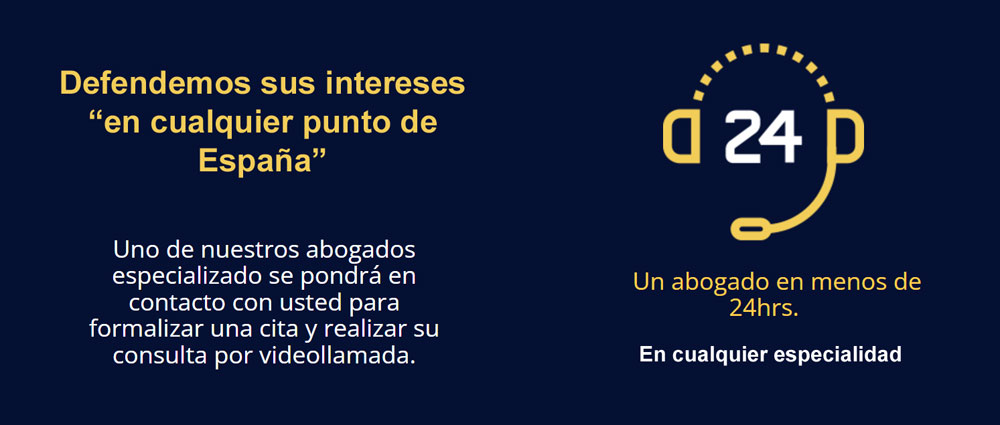
Table of contents
The offence of injury established by the Penal Code seeks to punish all those who cause bodily, physical and mental harm to other people. However, since neither the actions that can give rise to such damage nor the effects derived from them are the same, the legislation establishes different types. Here we would like to talk in depth about this offence, all its variants and the penalties and fines to which those who commit it are exposed.
What is the crime of injury under the Penal Code?
We must turn to Title III of Book II of the Criminal Code (CC) to find the regulation related to the crime of injury. Specifically, it appears in articles 147-156, in which it is established that it is any physical aggression that results in an impairment of the physical health, bodily integrity or mental well-being of another subject. In addition, it requires subsequent medical assistance and medical or surgical treatment.
The latter is particularly important. The reason is that, according to Article 147 of the Criminal Code, injuries caused by serious or less serious negligence, as long as they do not require medical and/or surgical assistance to be cured or at least treated, are not considered a crime. Therefore, it is not sufficient to receive initial medical assistance alone. This is a fact that will be discussed in more detail below.
The offence of injury in the Penal Code: types of offence
Since the PC was reformed in 2015 and the misdemeanour of injury was eliminated, this offence is classified differently depending on whether it results in basic, minor, serious or very serious injuries. In other words, it is no longer possible to go to a misdemeanour trial for minor injuries, but it would be necessary to hold a criminal trial. Therefore, it is always advisable to seek the advice of a lawyer specialising in criminal law whenever an injury offence has been committed.
Offence of minor injuries
It is typified in Article 147 PC (paragraphs 2 and 3) and is the simplest and least serious form of the offence. Specifically, it regulates those injuries that do not require surgical or medical treatment for their healing but are the consequence of an aggression. In fact, they can be caused by direct action (a blow) or by deed. It is the equivalent of the previous misdemeanour of injury.
Basic offence of wounding. . Article 147.1 penal code
According to article 147.1 PC, the basic offence of injury is considered to be any physical aggression against another person that entails a deterioration in their physical and/or mental health and that entails, in addition to medical follow-up, medical, pharmacological or surgical treatment for their cure. This is where it is specified that surveillance is not sufficient.
But what is the penalty or fine for hitting a person and causing injuries of this type? According to article 147.1 of the Penal Code, the convicted offender can be sentenced to a prison term of 3 months to 3 years and a fine of 6 to 12 months. In addition, depending on the damage suffered by the victim as a result of the aggression, the judge may set a compensation for minor injuries or any other compensation he considers appropriate.
For its part, Article 148 PC establishes an aggravated type of the basic offence of injury. What is taken into account, fundamentally, is the damage caused or the risk generated by the aggression. In fact, all these aspects are taken into account:
- The victim suffers from a disability or is under 12 years of age.
- The aggression was committed with malice aforethought and/or overkill.
- The aggressor has used weapons, objects or utensils that are especially dangerous for the victim's bodily integrity.
- The victim lives with the perpetrator or is considered to be a particularly vulnerable person.
- There has been a relationship of affection between the aggressor (a man) and the victim (a woman) whether they are married or in an analogous situation and regardless of whether they have lived together or not.
In this case, the prison sentence increases to a period of 2 to 5 years.
Offence of grievous bodily harm
We now move on to Article 150 of the Criminal Code to talk about the crime of grievous bodily harm. Specifically, it refers to all those physical aggressions that result in the uselessness or loss of an organ or non-main limb of the victim. Also included here is the causing of deformities and, in general, all types of damage that are not typified in article 149. We will talk about it below.
In this case, the prison sentence provided for by the Penal Code is 3 to 6 years.
Offence of very serious injury
Now we are going to focus on article 149 PC which, as we said before, is the one that focuses on injuries considered as very serious. Specifically, we are talking about those that result in the mutilation or disablement of a part of the body. We are going to detail them in order to make it clearer what was stated in the previous point:
- Genital mutilation. This includes clitoral cutting or non-medical circumcision.
- Causing impotence or sterility of the victim.
- Amputation, cutting or disabling of limbs leading to loss of senses or organs.
- Causing permanent deformity or aesthetic alteration of any visible part of the body, such as the face.
- Causing a serious psychological or somatic illness.
The offence of very serious injury is punishable by between 6 and 12 years' imprisonment. In addition, if the victim is a disabled person in need of special protection or a minor, the prison sentence is accompanied by a special disqualification from exercising guardianship, curatorship, foster care, guardianship or parental authority for a period of 4 to 10 years.
But what if an injury is consensual?
It is not common, but it can happen. For example, the assault can take place as a result of an erotic game played by two people or because of a woman's decision to submit voluntarily and on the basis of her religious beliefs to clitoral ablation.
In this case, it is necessary to refer to Article 155 of the Penal Code. It states that if there is free, express, spontaneous and valid consent, the penalty will be reduced by one or two degrees. The valid part is especially important as this exception does not apply if the victim is a minor or a disabled person requiring special protection.
Offence of reckless assault and battery
It is an offence of result, i.e. it is caused by the performance of another activity, not by a direct aggression. In fact, it is possible to commit it by omission. It should be stated from the outset that slight negligent injury is not punishable, so that a distinction is only made between serious and less serious negligence.
In any case, exactly what types of negligence are not punishable under the Criminal Code? Well, those that result in injuries that do not require surgical or medical treatment in order to be cured, regardless of the nature of the negligence (serious or less serious).
Serious negligence and less serious negligence
First of all, we are going to talk about the offence of grievous bodily harm, which is defined in article 152 of the Penal Code. In this regard, the seriousness of the injury should first be established and, based on this, the prison sentence and the fine:
- Article 147.1. Impairment of physical or mental health in need of medical assistance and treatment. Punishable by a fine of 6 to 18 months or imprisonment of 3 to 6 months.
- Loss or disablement of organs or senses, as well as impotence, sterility, genital mutilation, serious deformity or mental or somatic illness. It is punishable with imprisonment from 1 to 3 years.
- Article 150. Loss or disablement of a non-major organ or limb. It is punishable with imprisonment from 6 months to 2 years.
What happens if the offence of grievous bodily harm is committed with a vehicle? Firstly, in order to be considered as such, the driver must be under the influence of alcohol or other drugs or be driving well above the speed limit (more than 60 km/h above the speed limit in the city or more than 80 km/h above the speed limit on interurban roads). In this respect, the Penal Code establishes that the driver will be deprived of the right to drive for a period of 1 to 4 years in addition to the corresponding prison sentence or fine.
Finally, the offence of minor negligent injury refers to the rest of the articles mentioned above. Specifically, it is punishable by a fine of 3 to 12 months and the withdrawal of the driving licence from 3 months to 1 year if committed with a vehicle. We hope we have cleared up all your doubts about the crime of injury. Undoubtedly, one of the most extensive, complex and unfortunately common of all those covered by the Penal Code.
If you have had any problem related to the crime of injury, you can contact a criminal lawyer from our firm. In-person attention in Madrid and online defence anywhere in Spain.

"Anywhere in Spain"
With our online appointment system you will have immediate advice without the need for face-to-face visits or travel.
One of our lawyers specialized in your area of interest will contact you to formalize an appointment and make your consultation by video call.


Add new comment